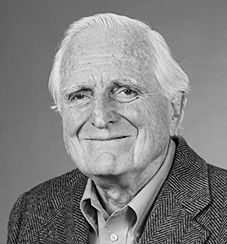He was the primary force behind the design and development of the multi-user oN-Line System (NLS), featuring original versions of human-computer interface elements including collaborative software, hypertext and precursors to the graphical user interface, such as the computer mouse.
In 1968, Engelbart and his team presented the NLS at a computer conference in a demonstration that quickly became known as “The Mother of All Demos.” In 1969 they became the second host on the ARPAnet, exchanging first transmissions with UCLA. A year later, Engelbart wrote “Intellectual Implications of Multi-Access Computer Networks,” in which he foretold the emergence of a new “marketplace” representing “fantastic wealth in commodities of knowledge, service, information, processing, and storage,” with “a vitality and dynamism as much greater than today’s as today’s is greater than the village market.” Engelbart also founded ARPAnet’s Network Information Center.
Engelbart received many awards. Among them are the United States National Medal of Technology and Innovation, the Association for Computing Machinery’s Alan M. Turing Award and the Institute of Electrical and Electronics Engineers’ John Von Neumann Medal. He also was awarded 21 patents, including the patent on the mouse.
Engelbart earned his BS degree from Oregon State and his PhD from UC Berkeley in Electrical Engineering. He died in 2013 at age 88.

